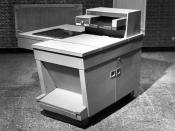Enjoying for decades a first mover's advantage, Xerox had a prominent beginning with the first xerographic copier. Recognized as the biggest selling industrial product of all time, the 914, with a 70% gross profit margin, became Xerox' Cash Cow for many years, and its profits covered whatever losses the company had in other unsuccessful business ventures. Spoiled by this success, Xerox harbored a bureaucracy within its administration (Burox) that did not allow for change and thwarted innovation. When Xerox' patents began to expire in the early 1970's competition from Japan became fierce as prices were cut down. The need for innovation became clear, and top management leadership was the key to success.
Allaire became CEO of Xerox after 24 years of working himself up through the finance and administration ranks. He was respected and well known within the company, and we assume he was a contender in the succession for CEO -an earned position.
He had the authority and confidence of the board to bring people form outside Xerox to revamp its structures, such as Romeril and Buehler. Because of an evident lack of "succession culture" at Xerox, Allaire was allowed to play "kingmaker" when choosing Thoman as his successor. And when his time to step down as CEO came, he stayed as Chairman of the board; by "keeping Elvis in the building" Allaire became the power behind the newly appointed CEO. In trying to reward his old team members before leaving, Allaire granted board positions to Romeril and Buehler, who were terribly jealous and resentful of Thoman's appointment as CEO and did what they could to prevent changes from happening.
Thoman was brought in by Allaire from the outside recommended by Ramsey Beirne Associates. With several high degrees earned at prestigious schools and an excellent track...



Xerox fall into complacency and the struggle for innovation
this essay was well written and interesting, i thought this was a good insight
1 out of 1 people found this comment useful.